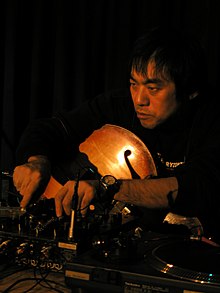Ground Zero (band)
Ground Zero | |
|---|---|
 Former band member Otomo Yoshihide | |
| Background information | |
| Origin | Tokyo, Japan |
| Genres | |
| Years active | 1990–1998 |
| Labels |
|
| Past members |
|
Ground Zero was a Japanese noise/improvisation band[1] during the 1990s led by the guitarist and "turntablist" Otomo Yoshihide that had a large and rotating group of performers with two other regular performers.[1]
History[edit]
Ground Zero was formed to play the John Zorn game piece Cobra.[2] They first played in August 1990 and last played in March 1998.[2] The band's last project was in 1998 when they re-worked material from a 1992 Cassiber concert in Tokyo; it was released on the second CD of Cassiber's double CD, Live in Tokyo (1998).
Musical style[edit]
The band performed on such instruments as turntables, sampler, shamisen, saxophone, koto, omnichord, electric guitar and two drum kits. They were one of the first free improvising musicians using turntables.[3]
Their music mixed free jazz, improvisation, rock and experimental noise.[2] Their albums include Revolutionary Pekinese Opera ver. 1.28, a sound collage piece combining noise music and samples of peking opera by the Duo Goebbels/Harth, and Consume Red, on which the performers improvise around a short sample of hojok music played by the Korean holy musician Kim Seok Chul.
Discography[edit]

Studio albums[edit]
- Ground Zero (1992)
- Null & Void (1995)
- Revolutionary Pekinese Opera (1995)
- Revolutionary Pekinese Opera Ver. 1.28 (1996)
- Consume Red (1997)[2]
- Plays Standards (1997)
Compilation albums[edit]
- Conflagration (1997)
- Consummation (1998)
Live albums[edit]
- Last Concert (1999)[1]
- Live 1992+ (2007)
Singles[edit]
- "Live Mao '99" (1995) (split with Bästard)
- "Revolutionary Pekinese Opera Ver. 1.50" (1996)
References[edit]
- ^ a b c Jenkins, Todd S. (2004). Free jazz and free improvisation: An encyclopedia. Westport, Conn.: Greenwood. p. 165. ISBN 978-0-313-29881-3.
- ^ a b c d Kelly, Caleb (2009). Cracked Media: The Sound of Malfunction. MIT Press. p. 188. ISBN 978-0-262-01314-7.
- ^ Christoph Cox; Daniel Warner (2004). Audio culture: readings in modern music. Continuum International Publishing Group. p. 405. ISBN 978-0-8264-1615-5.
External links[edit]
- Ground Zero at AllMusic
- Ground Zero discography at Discogs
- Ground-Zero at Improvised Music from Japan
